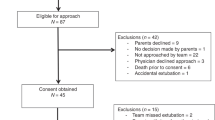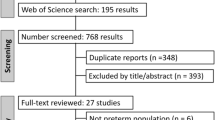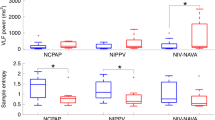Abstract
Objective
To evaluate the impact of parental bedside reading (PR) on cardio-respiratory (CR) stability of preterm infants.
Methods/Study design
Prospective examination of the impact of PR on CR stability in preterm NICU infants. CR data from 3 time points: pre-reading (3 and 1 h before reading), during PR, and post-reading (1 h after reading) were compared.
Results
Eighteen infants born at 23–31wks gestation, and 8 to 56 days old, were enrolled. Episodes of oxygen desaturation to <85% were fewer during PR as compared to the pre-reading periods and were fewer with live and maternal PR.
Conclusion
Preterm infants showed fewer desaturation events less than 85% during PR than prior to reading exposure. This effect persisted up to 1 h after reading exposure. Desaturation events were fewer with live and maternal PR. Voice exposure can be an important way for parents to participate in the care of their preterm infants.
This is a preview of subscription content, access via your institution
Access options
Subscribe to this journal
Receive 12 print issues and online access
$259.00 per year
only $21.58 per issue
Buy this article
- Purchase on Springer Link
- Instant access to full article PDF
Prices may be subject to local taxes which are calculated during checkout

Similar content being viewed by others
References
Hart B, Risley TR. Meaningful differences in the everyday experience of young American children. Baltimore: Paul H Brookes Publishing; 1995.
Hamilton B, Martin J, Osterman M, Curtin S, Mathews T. Births: Final Data for 2014. Natl Vital Stat Rep. 2015;64:1–65.
World Health Orgnaization [Internet]. Preterm birth fact sheet, November 2017. http://www.who.int/mediacentre/factsheets/fs363/en/. Accessed 4 April 2018.
Walsh MC, Bell EF, Kandefer S, Saha S, Carlo WA, D’angio C, et al. Neonatal outcomes of moderately preterm infants compared to extremely preterm infants. Pediatr Res. 2017;82:297–304.
Catts HW, Fey ME, Tomblin JB, Zhang X. A longitudinal investigation of reading outcomes in children with language impairments. J Speech Lang Hear Res. 2002;45:1142–57.
Mikkola K, Ritari N, Tommiska V, Salokorpi T, Lehtonen L, Tammela O, et al. Neurodevelopmental outcome at 5 years of age of a national cohort of extremely low birth weight infants who were born in 1996–1997. Pediatrics. 2005;116:1391–400.
Allen MC. Neurodevelopmental outcomes of preterm infants. Curr Opin Neurol. 2008;21:123–8.
Anderson P, Doyle L. Victorian Infant Collaborative Study Group. Neurobehavioral outcomes of school-aged children born extremely low birth weight or very preterm in the 1990s. JAMA. 2003;289:3264–72.
Aylward GP. Cognitive and neuropsychological outcomes: more than IQ scores. Ment Retard Dev Disabil Res Rev. 2002;8:234–40.
Bhutta AT, Cleves MA, Casey PH, Cradock MM, Anand KJ. Cognitive and behavioral outcomes of school-aged children who were born preterm: a meta-analysis. JAMA. 2002;288:728–37.
Johnson S, Hennessy E, Smith R, Trikic R, Wolke D, Marlow N. Academic attainment and special educational needs in extremely preterm children at 11 years of age: the EPICure study. Arch Dis Child Fetal Neonatal Ed. 2009;94:F283–9.
Luu TM, Ment LR, Schneider KC, Katz KH, Allan WC, Vohr BR. Lasting effects of preterm birth and neonatal brain hemorrhage at 12 years of age. Pediatrics. 2009;123:1037–44.
Foster-Cohen S, Edgin J, Champion PR, Woodward LJ. Early delayed language development in very preterm infants: evidence from the MacArthur-Bates CDI. J Child Lang. 2007;34:655–75.
Guarini A, Sansavini A, Fabbri C, Alessandroni R, Faldella G, Karmiloff-Smith A. Reconsidering the impact of preterm birth on language outcome. Early Hum Dev. 2009;85:639–45.
Stolt S, Klippi A, Launonen K, Munck P, Lehtonen L, Lapinleimu H, et al. Size and composition of the lexicon in prematurely born very-low-birth-weight and full-term Finnish children at two years of age. J Child Lang. 2007;34:283–310.
Le Normand M, Cohen H. The delayed emergence of lexical morphology in preterm children: the case of verbs. J Neurolinguist. 1999;12:235–46.
Sansavini A, Guarini A, Alessandroni R, Faldella G, Giovanelli G, Salvioli G. Are early grammatical and phonological working memory abilities affected by preterm birth? J Commun Disord. 2007;40:239–56.
Jansson-Verkasalo E, Valkama M, Vainionpää L, Pääkkö E, Ilkko E, Lehtihalmes M. Language development in very low birth weight preterm children: a follow-up study. Folia Phoniatr Logop. 2004;56:108–19.
Landry SH, Smith KE, Swank PR. Environmental effects on language development in normal and high-risk child populations. Semin Pediatr Neurol. 2002;9:192–200.
Pietz J, Peter J, Graf R, Rauterberg-Ruland I, Rupp A, Sontheimer D, et al. Physical growth and neurodevelopmental outcome of nonhandicapped low-risk children born preterm. Early Hum Dev. 2004;79:131–43.
Lee ES, Yeatman JD, Luna B, Feldman HM. Specific language and reading skills in school-aged children and adolescents are associated with prematurity after controlling for IQ. Neuropsychologia. 2011;49:906–13.
Foster-Cohen SH, Friesen MD, Champion PR, Woodward LJ. High prevalence/low severity language delay in preschool children born very preterm. J Dev Behav Pediatr. 2010;31:658–67.
Vohr B. Speech and language outcomes of very preterm infants. Semin Fetal Neonatal Med. 2014;19:78–83.
McMahon E, Wintermark P, Lahav A. Auditory brain development in premature infants: the importance of early experience. Ann N Y Acad Sci. 2012;1252:17–24.
Rand K, Lahav A. Impact of the NICU environment on language deprivation in preterm infants. Acta Paediatr. 2014;103:243–8.
Lahav A, Skoe E. An acoustic gap between the NICU and womb: a potential risk for compromised neuroplasticity of the auditory system in preterm infants. Front Neurosci. 2014;8:381.
Caskey M, Stephens B, Tucker R, Vohr B. Adult talk in the NICU with preterm infants and developmental outcomes. Pediatrics. 2014;133:e578–84.
Pineda RG, Neil J, Dierker D, Smyser CD, Wallendorf M, Kidokoro H, et al. Alterations in brain structure and neurodevelopmental outcome in preterm infants hospitalized in different neonatal intensive care unit environments. J Pediatr. 2014;164:52–60.
Santos J, Pearce SE, Stroustrup A. Impact of hospital-based environmental exposures on neurodevelopmental outcomes of preterm infants. Curr Opin Pediatr. 2015;27:254–60.
Fricke S, Bowyer-Crane C, Haley AJ, Hulme C, Snowling MJ. Efficacy of language intervention in the early years. J Child Psychol Psychiatry. 2013;54:280–90.
Lariviere J, Rennick JE. Parent picture-book reading to infants in the neonatal intensive care unit as an intervention supporting parent-infant interaction and later book reading. J Dev Behav Pediatr. 2011;32:146–52.
Krueger C, Parker L, Chiu SH, Theriaque D. Maternal voice and short-term outcomes in preterm infants. Dev Psychobiol. 2010;52:205–12.
Wachman EM, Lahav A. The effects of noise on preterm infants in the NICU. Arch Dis Child Fetal Neonatal Ed. 2011;96:F305–9.
Brown G. NICU noise and the preterm infant. Neonatal Netw. 2009;28:165–73.
American Academy of Pediatrics, Committee on Environmental Health. Noise: a hazard for the fetus and newborn. Pediatrics. 1997;100:724–7.
Feldman R. Parent-infant synchrony and the construction of shared timing; physiological precursors, developmental outcomes and risk conditions. J Child Psychol Psychiatry. 2007;48:329–54.
Acknowledgements
This work was supported by the Juliet Grace Smith Foundation.
Author information
Authors and Affiliations
Corresponding author
Ethics declarations
Conflict of interest
The authors declare that they have no conflict of interest.
Rights and permissions
About this article
Cite this article
Scala, M., Seo, S., Lee-Park, J. et al. Effect of reading to preterm infants on measures of cardiorespiratory stability in the neonatal intensive care unit. J Perinatol 38, 1536–1541 (2018). https://doi.org/10.1038/s41372-018-0198-4
Received:
Revised:
Accepted:
Published:
Issue Date:
DOI: https://doi.org/10.1038/s41372-018-0198-4
This article is cited by
-
Effect of maternal voice on proportion of oral feeding in preterm infants
Journal of Perinatology (2023)
-
Disparity drivers, potential solutions, and the role of a health equity dashboard in the neonatal intensive care unit: a qualitative study
Journal of Perinatology (2023)
-
Listening to Mom in the NICU: effects of increased maternal speech exposure on language outcomes and white matter development in infants born very preterm
Trials (2021)
-
Visitation restrictions: is it right and how do we support families in the NICU during COVID-19?
Journal of Perinatology (2020)
-
Assessing speech exposure in the NICU: Implications for speech enrichment for preterm infants
Journal of Perinatology (2020)



